chapter xii
Rituals
of the Hexagram
The rituals of the Hexagram, while sharing certain surface similarities to those of the Pentagram are related to an ontologically higher level. The Pentagram symbolizes the dominion of the equilibrated microcosm over its constituent elements. The Hexagram symbolizes the macrocosm, inclusive of and in union with that equilibrated microcosm.
The symbol is composed of two interlaced triangles and is known within the Jewish tradition as the Magen David, or Star of David. The triangles represent the union of God and Man achieved in the Knowledge and Conversation of the Holy Guardian Angel. The figure's six points allude to the Sephirah Tiphareth, where this attainment occurs. Its ability to be inscribed exactly within a circle shows, like the Pentagram, that its significance devolves from the divine unity. Typically, the downward pointing triangle is understood to be that of Water, the upward pointing one that of Fire. These can be depicted as blue and red respectively. There is a counter-charged Thelemic variant of the Hexagram, which Crowley describes in The Book of Lies in the comment to Chapter 69.
"In the ordinary Hexagram, the Hexagram of nature, the red triangle is upwards, like fire, and the blue triangle downwards, like water. In the magical Hexagram this is reversed; the decending red triangle is that of Horus, a sign specially revealed by him personally, at the Equinox of the Gods. (It is the flame decending upon the altar, and licking up the burnt offering.) The blue triangle represents the aspiration, since blue is the color of devotion, and the triangle, kinetically considered, is the symbol of directed force."
There is an additional layer of symbolism of the Hexagram related to the seven Ptolemaic planets. If the Pentagram and its rituals represent the plane of the terrestrial elements, the Hexagram represents the plane of the planets, centered in the Sun, which is ultimately a symbol of the Holy Guardian Angel. Part of the work of the adept is to harmonize the aspects of the psyche with the Higher Self, of which the planets form the aspects. This is the ultimate purpose of planetary Magick.
In working with these archetypes the magician will quickly discover that they represent a higher level of divine energy and consciousness than that of the elemental archetypes. If the elemental forces are often below the level of magical coherence of the ego-consciousness of the magician, the planetary forces are likewise often above that level. As a result, working with planetary Magick is often as much being worked on by the planets. This can make this kind of Magick, if not precisely dangerous, at least difficult, as it requires the release of a certain direct agency to allow superconsciousness to work upon ego-consciousness. Failure to approach this kind of work correctly can result in the manifestation of the shadow or Qlipphotic aspect of the planetary archetype, usually directly within the psyche of the magician in the form of mood swings, emotional problems and obsession. A thorough and full grounding in more general magical work is one of the best means of avoiding these difficulties. At the same time, beginners often can have excellent experiences with planetary invocations. With regard to readiness therefore, there is no definite benchmark. As always, personal experience will be the best guide.
In the Thelemic tradition, as well as in the G.D. system that preceded it, the rituals of the Hexagram provide a means of engaging with planetary Magick. They can be used to invoke or banish the planets, either singly or in concert. To do this, particular planets are assigned to the points of the Hexagram, exactly as with the elements and the Pentagram. The correspondences are based upon placing the Hexagram upon the Tree of Life, which aligns a Sephirah and its associated planet to each point. There are two exceptions. The Sun in Tiphareth goes at the geometrical center of the Hexagram, and Saturn in Binah goes at the topmost point standing in for the unity of all three Supernals.

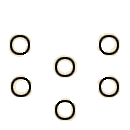

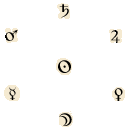
Underscoring the symbolism of the planets as primary aspects or emanations of the divine Unity, each planet is associated with a letter of the Kabbalistic formula ARARITA. This word, which first begins to appear in Kabbalistic texts of the 17th century, is a notaricon formed from the initials of the Hebrew phrase: "Achad Rayshethoh, Achad Resh Yechidathoh, Temurathoh Achod." This means: "One is His beginning, One is His individuality, His permutation is One." In Regardie's papers that have come down to us from the Golden Dawn the assignment of planets to letters is done as follows:
Saturn — Aleph
Jupiter — Resh
Mars — Aleph
Sun — Yod
Venus — Resh
Mercury — Tav
Luna — Aleph
If placed visually about the Hexagram, this gives the following rather asymmetrical figure.
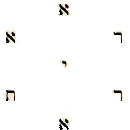
Aleister Crowley gives a slightly different sequence of attributions. They are:
Saturn — Aleph
Jupiter — Resh
Mars — Resh
Sun — Yod
Venus — Aleph
Mercury — Aleph
Luna — Tav
When placed on the Hexagram itself, this gives a more symmetrical figure.
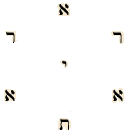
Should the Ararita formula be used, the magician should select one of these two schemes.
The basic rule for drawing the symbol to invoke or banish a particular planet is simple. Starting from the point assigned to that planet, draw the first triangle clockwise from that point to invoke. Then draw the second triangle clockwise starting from the opposite angle than the one begun from. To banish a planet do exactly the same, but draw the two triangles counterclockwise. To invoke or banish the Sun the procedure is more involved. The invoking or banishing forms of the Hexagram for all six of the other planets are drawn sequentially in Ptolemaic or Tree of Life order. That is: Saturn, Jupiter, Mars, Venus, Mercury, and Luna. This implies symbolically that the equilibration of all the aspects of the psyche will naturally disclose their central unifying factor in the True Will, as represented by the Sun. See the chart at the end of the chapter for an illustration of these forms.
There is a Thelemic tradition of using a variant of the standard form of the Hexagram, called the Unicursal Hexagram. It is called Unicursal because, unlike the standard form of the shape, it can be drawn with a single line. This form of the symbol has become almost synonymous with the Thelemic religion itself, and to use it with these rituals is to customize them to this tradition. The rule of how to draw this form is different, because due to the geometry of the symbol the clockwise or counterclockwise direction of the line does not stay uniform, but always reverses itself. (Trace it and see.) Therefore, it has become customary to adapt the rule for drawing Pentagrams. To invoke a planet, draw towards its angle. To banish, draw away from its angle. The particular direction should also begin going clockwise to invoke, counterclockwise to banish. See the chart for examples. This form has the advantage of requiring only a single Hexagram to be traced for the Sun. There is, however, a choice as to which directions to draw to or away from to invoke or banish this central planet. The version given on the chart is that used by Lon DuQuette in his writings.
The invoking or banishing Hexagrams of Saturn are suitable, within certain contexts, to act as a stand in for all of the other Hexagrams, exactly as in the use of the Pentagram of Earth in the LRP. This is done, for example, in the most basic of the Hexagram rituals — The Lesser Ritual of the Hexagram (LRH). This ritual is intended as a general invocation of balanced energy on the planetary plane. Its performance usually follows that of the Pentagram ritual. It can be performed with the magic sword, the wand, the hand, or with a specialized G.D. implement called the Lotus Wand.
In this ritual, the magician goes about to the four quarters of the universe, making a circle about the temple as she does so, exactly as in the Pentagram rituals and with the same range of meanings. The particular attribution of elements to the quarters is different, however. For the Pentagram rituals, the attribution was Terrestrial or By the Winds. In the Hexagram rituals the directions are Sidereal, based upon the cross formed by the fixed signs of the Zodiac in the heavens. Leo, for Fire, is placed in the East, and the quarters are read from that position. These Sidereal, as opposed to Terrestrial directions of the elements, show symbolically that the rituals of the Hexagram deal with a magically higher plane than those of the Pentagram. This attribution also serves to symbolically align the magician along the Aquarius/Leo axis of the Zodiac. These are the pair of signs associated with the astrological Age of Aquarius, which is closely tied to (if not possibly identical with) the Aeon of Horus.
The Golden Dawn documents that come down to us through Israel Regardie indicate beginning the LRH with the Kabbalistic Cross. Aleister Crowley's version of the same ritual in Liber O has it begin with something called the 'Analysis of the Keyword'. Both versions end with this analysis. Thelemic tradition has tended to follow Crowley's lead, though there is no a priori reason why the Kabbalistic Cross can't be used to open the ritual.
The particular 'keyword' that is analyzed are the initials I.N.R.I. which, interpreted according to a certain technology of initiation, reveal formulae of attainment. I.N.R.I., in the Christian tradition, are the Latin initials of "Jesus of Nazareth, King of the Jews". This is the inscription said to have been placed above Jesus by Pontius Pilate during the crucifixion. These initials have been assigned a variety of esoteric readings within the Western mysteries.
In the Golden Dawn, the letters are interpreted within the 5°=6 initiation. The initiated knowledge of this interpretation is said to open the vault of the Adepts — the tomb of Christian Rosencreutz deep within the mountain of Abeignis. The reading itself is a kind of universalization of the mysteries of the Crucifixion. That is to say, the G.D. use of the I.N.R.I. formula is not specifically Christian.
The keyword I.N.R.I. is analyzed by first substituting Hebrew letters for the Latin. I.N.R.I. = Yod — Nun — Resh — Yod (ינרי). Each of these letters has certain astrological correspondences within the G.D. system. The initials now give: Virgo — Scorpio — The Sun — Virgo. The repetition of Virgo shows a loop. This formula is therefore of a cycle that repeats itself in the life of the initiate.
The roots of the sequence are the first three components, Yod — Nun — Resh or Virgo — Scorpio — The Sun. The four-part I.N.R.I. formula now reveals a deeper 'core' formula of three parts. This is equated with the three-letter formula IAO. 'I' is Isis, the divine mother, for Virgo. 'A' is Apophis / Typhon, the destroyer, for Scorpio. 'O' is Osiris, the slain and risen, for the Sun. These gods and their myth show a powerful process in the life and spiritual practice of the initiate. One begins an endeavor with a sense of initial enthusiasm. Things proceed easily. This is the Isis phase. Then 'dryness' intervenes. The necessary difficulties besetting any undertaking threaten, and one's original enthusiasm gets used up. The real work begins. This is the Apophis stage. Finally, if one perseveres, a breakthrough occurs, and the work succeeds rewarding all effort. This is the Osiris risen phase.
The IAO formula is then tied back into the original crucifixion association of I.N.R.I. Four signs are given, assigned to the stages of the IAO myth. There is a sign for Osiris slain, a sign for the mourning of Isis, a sign for Apophis and Typhon, and a sign for Osiris risen. The arm movements of these signs form the letters L, V, and X, or LUX (light in Latin). This is said to be the 'light of the cross'. That is to say, by understanding and using the IAO formula hidden within the letters I.N.R.I., the initiate can access the spiritual enlightenment symbolized by the Cross.
There is a short ritual to enact this analysis. While the main body of description is canonical, the various gestures and symbols drawn, described in parenthesis, are from a Berkeley oral tradition of performance.
Analysis of the Keyword
- Face East. (If using a wand or other implement, hold it upright in front of the body.)
- Say, I.N.R.I.
- Say, Yod, Nun, Resh, Yod. (Inscribe these Hebrew letters in the air as you say them.)
י נ ר י
- Say, Virgo, Isis, Mighty Mother. (Inscribe the sign of Virgo in the air before you.)

- Say, Scorpio, Apophis, Destroyer. (Inscribe sign of Scorpio.)
- Say, Sol, Osiris, Slain and Risen. (Inscribe the sign of the Sun. Begin the circle clockwise, starting at the top, then make the central point by thrusting the wand through the center of the circle.)
- Say, Isis, Apophis, Osiris IAO. (While saying each of the first three names, make again the signs of Virgo, Scorpio and the Sun.)
- Make the sign of Osiris Slain. (Stand with the feet together and the arms outstretched to form a cross.) Look forward. Say: The Sign of Osiris Slain.
- Make the sign of the Mourning of Isis. (Point the right arm up, keeping the elbow square. Point the left arm down, again keeping the elbow square. Look down and to the left, towards the left hand.) Say: The Sign of the Mourning of Isis.
- Make the sign of Apophis and Typhon. (Raise the arms above the head in a 'V' shape. Look up.) Say, The Sign of Apophis and Typhon.
- Make the sign of Osiris Risen. (Cross the arms over the breast. Look down.) Say, The Sign of Osiris Risen.
- Repeat the signs of Osiris Slain and Osiris Risen while saying, L.V.X., the Light of the Cross. (Or repeat all of the L.V.X. signs while saying, L.V.X., Lux, the Light of the True Rose Cross.)
This completes the Analysis of the Keyword. The letters L, V and X, which spell the Latin Lux or light, are understood as being formed by the signs of Osiris Slain, Apophis and Typhon and Osiris Risen, respectively as such:

The Lesser Ritual of the Hexagram also uses three other variants of the regular Hexagram symbol, deriving originally from one of the illustrations in Add. MSS. #10862 of The Greater Key of Solomon. This was one of the seven codices used by Mathers to compile his 1888 edition of this Grimoire. The alternative forms are:
The Hexagram of Fire:
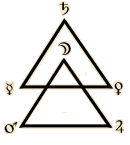
The Hexagram of Air:
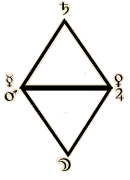
The Hexagram of Water:
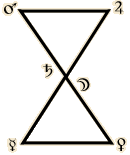
And the Hexagram of Earth, which is the traditional design:

Just like the Hexagram of Earth, all of these elemental Hexagrams have different forms depending on whether one is invoking or banishing any of the planets. These different forms follow the same rule as for the standard design of the Hexagram, as described above. See the chart at the end of this chapter for illustrations of all forms.
Like the LRP, the Lesser Ritual of the Hexagram moves clockwise about the circle of the working, regardless of whether or not its invoking or banishing form is being performed. These symbolic keys having been grasped, the ritual itself is quite straightforward.
Lesser Ritual of the Hexagram
- Face East. Perform the Analysis of the Keyword.
- Trace the Invoking Hexagram of Fire for Saturn in the East, saying ARARITA.
- Move clockwise to the South. Draw the Invoking Hexagram of Earth for Saturn while vibrating ARARITA.
- Move clockwise to the West. Make the Invoking Hexagram of Air for Saturn while saying ARARITA.
- Move clockwise to the North. Trace the Invoking Hexagram of Water for Saturn, vibrating ARARITA.
- Return to the center, facing East. Perform the Analysis of the Keyword.
To perform the banishing form of this ritual, do exactly as above, including moving clockwise about the circle, but use the four banishing Hexagrams of Saturn. The original form of this ritual has the magician vibrate the word ARARITA while inscribing the Hexagrams. A common and effective variation is to first make the Hexagram, then thrust the wand through the center of the visualized figure while vibrating the word.
In the Regardie papers, reference is made to a Supreme Ritual of the Hexagram. One might suppose, in parallel with the rituals of the Pentagram, that this would be a more advanced form of Hexagram ceremony than the Lesser Ritual of the Hexagram. However, this appears not to be the case, and there is no such published surviving ritual from the original Golden Dawn. Instead, a close reading of the original instructional texts shows that by 'Supreme Ritual of the Hexagram' is meant the invocation or banishing of a particular planet, zodiacal sign or Sephirah through the use of the Hexagram. The exact procedure to do so is presented very unclearly in the original texts, and the tendency has been for various oral traditions to arise with different approaches as to method. However, if all of the scattered instructions in the original G.D. material are collected, a coherent ritual emerges.
Supreme Ritual of the Hexagram
To invoke a particular planet (original G.D. method):
- Perform the Lesser Banishing Ritual of the Pentagram followed by the Lesser Banishing Ritual of the Hexagram to clear the space.
- Turn to the quarter of the heavens that the particular planet to be invoked is physically located. To do this create a horoscope chart of the heavens at the time of the ritual and place it on the altar with the ascendant facing East. Then simply look about the circle of the chart to find the quarter closest to where the planet is located along the ecliptic.
- Perform the Lesser Invoking Ritual of the Hexagram, taking that quarter as 'East', and using the invoking forms of the four elemental Hexagrams appropriate to that planet.
- Returning to the quarter of the planet, draw the invoking Hexagram of Earth of that planet. Then trace the symbol of the planet in the center of the Hexagram, tracing it left to right and clockwise as much as possible. Vibrate the God-name of the Sephirah associated with that planet. Vibrate the word ARARITA as well as the specific Hebrew letter of Ararita corresponding to the planet.
To banish, as opposed to invoke, a particular planet begin with a license to depart and then perform the 'inverse' of the above. Unfortunately, there are no further details on exactly what to 'invert'. Presumably, one would again turn to the quarter of the heavens occupied by the planet and perform the Lesser Ritual of the Hexagram using the banishing forms of the four elemental Hexagrams appropriate to the planet in question. Upon completing the circle, one would trace the banishing Hexagram of Earth for that planet, followed by the planetary symbol and names as above.
There are a few additional details that can be extracted from the source texts. The G.D. papers give instructions to draw the symbol of the Moon as a leftward facing crescent when waxing  and a rightward facing crescent when waning
and a rightward facing crescent when waning  . An empty circle should be drawn for the full moon
. An empty circle should be drawn for the full moon  and a dark circle for the new
and a dark circle for the new  .
.
To invoke or banish a Zodiacal sign, follow the basic procedure above, turning to the quarter of the heavens occupied by the sign. Use the elemental Hexagrams for the planet ruling the sign, and when making the final Hexagram, inscribe the astrological symbol for the sign. Though this is not specified, one would presumably then vibrate the names associated with the ruling planet, as above.
The Hexagram rituals can also be used to invoke or banish a Sephirah. The G.D. taught that the Hexagram should be used for this purpose rather than the Pentagram, as the Hexagram is a symbol of the Macrocosm, whereas the Pentagram only shows the operation of the Sephiroth in the Microcosmic or elemental realm. One should use the Hexagrams of the planet associated with the Sephirah being worked with. The Hexagrams of Saturn are used for any of the Supernals, and those of the Moon for both Yesod and Malkuth. The ritual should probably begin facing East, rather than some other quarter. There are no instructions in the original G.D. material on what symbol to draw in the final Hexagram, or what divine names to use, so it is unclear how to differentiate the ritual from a regular planetary working.
The previous appears, based upon the original texts, to be the methodology of the original Golden Dawn, prior to 1900, but it is not the procedure used by most Thelemic magicians today. Instead, modern methods tend to be based on Crowley's Liber O, which presents a much more simplified set of directions then those above. Crowley somewhat confusingly refers to the invocation or banishing of a particular planet, zodiacal sign, or Sephirah as the Greater Ritual of the Hexagram, as opposed to the Supreme Ritual of the Hexagram, which is the G.D. designation. This does help us to differentiate the two schools of technique, however.
Greater Ritual of the Hexagram
To invoke or banish a particular planet (modern Thelemic method):
- Perform the Lesser Banishing Ritual of the Pentagram followed, optionally, by the Lesser Banishing Ritual of the Hexagram to clear the space. Optionally, use the Star Ruby and the Star Sapphire.
- Either face East or turn to the quarter of the heavens where the planet is located.
- Perform the analysis of the keyword.
- Make the invoking or banishing Hexagram of Earth for the planet. Draw the symbol of the planet in the center of the Hexagram, tracing it left to right and clockwise as much as possible to invoke. If banishing, trace right to left and counterclockwise. Vibrate the God-name of the planet and the name ARARITA.
- Repeat for each quarter moving clockwise to invoke, counterclockwise to banish.
- Completing the circle, repeat the analysis of the keyword.
This ritual form can be modified, as above, to invoke particular signs of the Zodiac and Sephirah.
There is also a more meditative method of invoking and banishing a particular planetary archetype. Seated in one's Asana one should clearly visualize one's aura as brilliant white. Take a few minutes of rhythmic breathing to establish this. Gradually, the aura's color shifts to the color corresponding to the desired planet. This should be: Saturn — Indigo, Jupiter — Blue, Mars — Red, Sun — Yellow, Venus — Green, Mercury — Orange, Luna — Purple. The aura's light radiates outwards, filling the ritual space with astral light of the planet's color. To banish, visualize the light as drawn back into the personal aura, which then gradually shifts back to white. This method is particularly recommended in conjunction with recitations of corresponding chapters in the Holy Book Liber 7.
As with the rituals of the Pentagram, Crowley composed an explicitly Thelemic form of Hexagram ritual. This is Liber 36, The Star Sapphire. The Star Sapphire is among the most esoteric of Crowley's rituals. Ebony Anpu used to joke that there were two versions, 'stand-up' and 'lie-down'. This discussion will not be a commentary on the latter. Rather, it will largely limit itself to a general description of the ritual's outer symbolic aspects through which it shares much in common with the G.D. Hexagram spells already discussed. Liber 36 is best first approached in this manner. The deeper levels of interpretation disclose themselves through this outer symbolic framework.
The number of the ritual is 36, which is the square of 6, the number of the Hexagram, of Tiphareth and of the Knowledge and Conversation of the Holy Guardian Angel. Numerologically, to square a number is to signify its magnification through itself. Therefore, this number symbolizes that the Star Sapphire is an enhancement of previously existing Hexagram rituals.
Liber 36: The Star Sapphire
Let the Adept be armed with his Magick Rood (and provided with his Mystic Rose).
In the center, let him give the L.V.X. signs; or if he know them, if he will and dare do them, and can keep silent about them, the signs of N.O.X. being the signs of Puer, Vir, Puella, Mulier. Omit the sign I.R.
Then let him advance to the East, and make the Holy Hexagram, saying: PATER ET MATER UNUS DEUS ARARITA.
Let him go round to the South, make the Holy Hexagram, and say: MATER ET FILIUS UNUS DEUS ARARITA.
Let him go round to the West, make the Holy Hexagram, and say: FILIUS ET FILIA UNUS DEUS ARARITA.
Let him go round to the North, make the Holy Hexagram, and then say: FILIA ET PATER UNUS DEUS ARARITA.
Let him then return to the Center, and so to The Center of All (making the ROSY CROSS as he may know how) saying: ARARITA ARARITA ARARITA.
(In this the Signs shall be those of Set Triumphant and of Baphomet. Also shall Set appear in the Circle. Let him drink of the Sacrament and let him communicate the same.)
Then let him say: OMNIA IN DUOS: DUO IN UNUM: UNUS IN NIHIL: HAEC NEC QUATUOR NEC OMNIA NEC DUO NEC UNUS NEC NIHIL SUNT.
GLORIA PATRI ET MATRI ET FILIO ET FILIAE ET SPIRITUI SANCTO EXTERNO ET SPIRITUI SANCTO INTERNO UT ERAT EST ERIT IN SAECULA SAECULORUM SEX IN UNO PER NOMEN SEPTUM IN UNO ARARITA.
Let him repeat the signs of L.V.X. but not the signs of N.O.X.: for it is not he that shall arise in the Sign of Isis Rejoicing.
"Let the Adept …". This ritual symbolizes the Magick of the Adept. That is, it represents the consciousness of the attainment of the Knowledge and Conversation of the Holy Guardian Angel, attained through the union of opposites; through the uniting of subject and object in Samadhi.
"… Armed with his Magick Rood (and provided with his Mystic Rose)." The Rood or Rod of the magician is their sacred Wand. This is a form of the cross upon which the rose blooms, understood in the Thelemic tradition as a symbol of the union of opposites. The Rood and Rose are therefore symbols of the divine polarity on all planes, including, but not limited to, the physical. Magick is extroverted, as Mysticism introverted, signifying that this ritual should involve a synthesis of both.
"In the Center …". The center is the center of the ritual space, which symbolizes the Axis Mundi, the spiritual pole of the cosmos, which is ultimately the Angel itself. All contraries are reconciled at this point. This is also the center of the Rose wherein the Rood rests. The Center therefore simultaneously symbolizes the Rood, the Rose and their unity.
"Give the L.V.X. signs". This refers to the Analysis of the Keyword, described fully earlier in this chapter. These are the signs of Tiphareth, and represent the arising of consciousness of the True Self through the spiritual formula they represent.
"Or … the signs of N.O.X.". These are described fully in Chapter 7, and constitute a higher octave version of the L.V.X. signs. They relate to the Supernal reality, disclosed by the deepening attainment of the Adept.
"… Being the signs of Puer, Vir, Puella, Mulier. Omit the sign I.R.". This means to perform the N.O.X. signs with the signs of Son, Father, Daughter and Mother, but to leave out the sign of Isis Rejoicing or Mater Triumphans at this point of the ritual. This sign represents the Quintessence of the four other principles which are set at the quarters, and will be momentarily disclosed at the Center following their dissolution.
"… Make the Holy Hexagram". Liber 36 does not specify which form of the Hexagram to use. There are various traditions on how to address this. The four forms of the invoking elemental Hexagrams for Saturn can be used, exactly as in The Lesser Ritual of the Hexagram. Ebony Anpu understood these to represent diagrammatically the form of sexual union of each quarter's couple. Alternatively, the Invoking Unicursal Hexagram for Saturn can be used at all four quarters, or the Invoking Unicursal Hexagram for the Sun. Finally, one can use the Invoking Hexagram of Earth for Saturn. The magician should experiment with these various forms to find the one that works for them. In all cases, the interlocking components of the Hexagrams represent the Unity of the two aspects invoked at each quarter.
The aspects of the quarters are Latin. Pater is Father, Mater Mother, Filius Son, and Filiae Daughter. These represent the four basic aspects of reality — the four elements, the four worlds etc. Each quarter invokes one of the four possible combinations of these aspects. Their implied sexual union discloses their underlying unity as 'Unus Deus', 'One God'.
"Let him then return to the Center, and so to The Center of All."
"Also he taught me the holy unutterable word Ararita, so that I melted the sixfold gold into a single invisible point, whereof naught may be spoken." (
Liber 65: Chapter 5, verse 15 )
"(Making the Rosy Cross as he may know how)". The magician effects the union of opposites within themselves in whatever manner and on whatever planes their level of initiation allows them to. This does not necessarily signify a sexual act, except insofar as a sexual act is a reflection of the true formula of the Rosy Cross, which is the union of subject and object in Samadhi, the Knowledge and Conversation of the Holy Guardian Angel.
An oral tradition of performing a ritual gesture to symbolize this attainment is to inscribe a cross and circle in the air, visualized in white light, with three gestures, vibrating the word ARARITA with each movement.
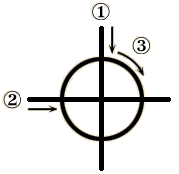
The vertical bar of the cross is drawn first from the top down. The circle is inscribed clockwise, beginning with the uppermost point, where the circumference intersects the vertical line. These movements recapitulate some of the symbolism of the Kabbalistic Cross, as described in Chapter 7.
This is the most important moment in the ritual, and regardless of the ceremonial action taken the magician should at this point concentrate the whole of their available Will towards their highest possible Idea.
"In this the Signs shall be those of Set Triumphant and of Baphomet." These are alternative designations for the signs of Mater Triumphans and of Mulier, respectively.
The sign of Mater Triumphans is also called the sign of Set Triumphant. This requires some explanation. Set is Saturn, which corresponds to the Sephirah Binah. Set is triumphant in the murder of Osiris, whose death represents the slaying of the phenomenal ego in Samadhi, which discloses the Briatic reality of Binah. The Sign of Mater Triumphans, corresponding to Binah, is also called the Sign of Isis Rejoicing in Liber 36. This signifies the birth of Horus by Isis to avenge the death of his father, implying the victory of Set in the slaying of that Father. Horus represents the Holy Guardian Angel that is disclosed in the Samadhi of the Adept. Giving this sign at this point of the Star Sapphire also completes the Signs of N.O.X. which optionally began the ritual. Baphomet is the Thelemic Tantric deity of non-duality — male, female, God, man and beast as One. The essence of this God is disclosed by the execution of the formula of the Rose Cross. The sign of Mulier, which signifies this disclosure, shows that the magician is receptive to the accomplishment of the sacrament, yielding their ego in sacrifice upon the altar of their own Higher Self.
"Also shall Set appear in the circle." Set is also Malkuth, the most material and sensual manifestation of deity. Set is therefore the divinized magician themselves. In the context of this ritual Set is also the generative organs, among many other meanings. These are not understood merely as such, however. 'Kether is in Malkuth, and Malkuth is in Kether, but after another fashion.' Set can also be seen as an aspect of Baphomet. The Holy Book Liber Capricornus can be read as an expansion of some of the meanings of this part of the Star Sapphire.
"Let him drink of the sacrament and communicate the same." This refers to the Eucharist of One Element, generated as a result of the 'making of the Rosy Cross' above. See the discussion of this Eucharist in Chapter 11.
"Then let him say: OMNIA IN DUOS: DUO IN UNUM: UNUS IN NIHIL: HAEC NEC QUATUOR NEC OMNIA NEC DUO NEC UNUS NEC NIHIL SUNT. GLORIA PATRI ET MATRI ET FILIO ET FILIAE ET SPIRITUI SANCTO EXTERNO ET SPIRITUI SANCTO INTERNO UT ERAT EST ERIT IN SAECULA SAECULORUM SEX IN UNO PER NOMEN SEPTEM IN UNO ARARITA."
Which means, "All in Two, Two in One, One in None. These are neither Four nor All, nor Two, nor One nor None. Glory be to the Father and to the Mother, and to the Son, and to the Daughter, and to the Holy Spirit without, and to the Holy Spirit within, which was, is, and shall be, World without end. Six in One through the name Seven in One, ARARITA."
The invocation is an affirmation of the realization of the underlying divine non-dual Unity of all of the symbolic elements of the ritual.
This is an adaptation of a well known, but very cryptic, Christian prayer called the "Glory Be". As recited by Roman Catholics it goes like this:
"Glory be to the Father and the Son and the Holy Spirit. As it was in the beginning, is now, and ever shall be, World without end, Amen."
"Let him then repeat the signs of L.V.X. but not the signs of N.O.X.". The ritual ends with the Analysis of the Keyword, as do the other Hexagram rituals. The N.O.X. signs are perhaps not reused because their formula of annihilation has been accomplished by the ritual. All that remains is for this attainment to be reflected down upon the lower plane of Tiphareth, representing the child or issue of the union of opposites effected by the formula of the Rosy Cross. This child is magically the Adept themselves.
"For it is not he that shall arise in the sign of Isis Rejoicing". Isis Rejoicing, or Mater Triumphans is assigned to Binah, the Great Mother who gives birth to the Crowned and Conquering Child Horus as Tiphareth. The magician at this final point of the ritual is therefore posited as that child through the Signs of L.V.X. (The two concluding instructions of Liber 36 are obscure, and these explanations are only presented as my own understanding.)
Here is how to draw the invoking hexagrams, and the banishing hexagrams
Crowley, Aleister, The Book of Lies, pg. 149.
Regardie, Israel, The Golden Dawn, pg. 289-292.
Crowley, Aleister, Commentaries on the Holy Books: The Equinox Vol. IV #1, pg. 193.
DuQuette, Lon Milo, The Magick of Thelema, Samuel Weiser, York Beach, Maine, 1993, pg. 118.
Mathers, S. Liddell MacGregor, The Key of Solomon the King, Samuel Weiser, York Beach, Maine, 1974, pg. Ix, 17.
Regardie, Israel, The Golden Dawn, pg. 294-295.
Rewritten from the version given in Liber O, Crowley, Aleister, Magick: Book 4, pp. 621-622.
Reconstructed from Regardie, Israel, The Golden Dawn, pg. 287-299.
Rewritten from instructions given in Liber O, as interpreted by modern oral traditions. Compare with Crowley, Aleister, Magick: Book 4, pg. 623.
Ibid, pg. 570.
Crowley, Aleister, The Holy Books of Thelema, pg. 77.


